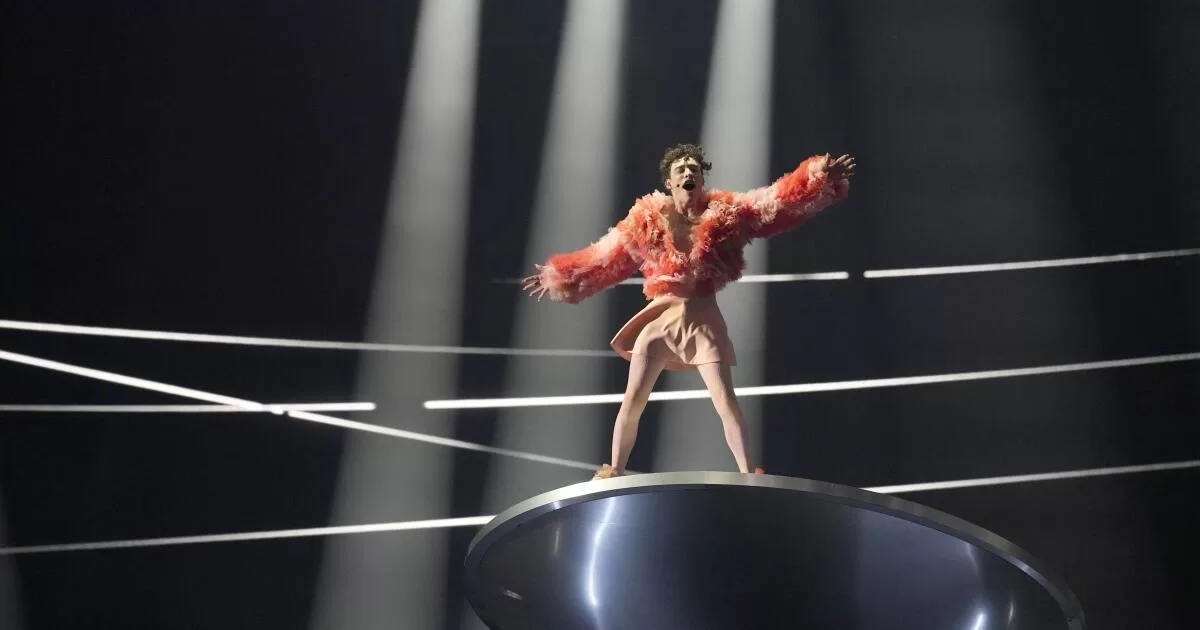Nemo beat Croatia’s Baby Lasagna to the title by winning the most points from a combination of national juries and viewers around the world. They are the first nonbinary winner.
“Thank you so much,” Nemo said after the result was announced. “I hope this contest can live up to its promise and continue to stand for peace and dignity for every person.”
Nemo’s victory in Malmo followed a turbulent year for the pan-continental pop contest that saw large street protests against the participation of Israel that tipped the feel-good musical celebration into a chaotic pressure cooker overshadowed by the war in Gaza.
Hours before the final, Dutch contender Joost Klein was expelled from the contest over a backstage altercation that is being investigated by police.
Nemo bested finalists from 24 other countries, who all performed in front of a live audience of thousands and an estimated 180 million viewers around the world. Each contestant had three minutes to meld catchy tunes and eye-popping spectacle into performances capable of winning the hearts of viewers. Musical styles ranged across rock, disco, techno and rap — sometimes a mashup of more than one.
The contest returned to Sweden, home of last year’s winner Loreen, a half-century after ABBA won Eurovision with “Waterloo” — Eurovision’s most iconic moment. ABBA did not appear in person in Malmo, though their digital “ABBA-tars” from the “ABBA Voyage” stage show did.
A trio of former Eurovision winners — Charlotte Perrelli, Carola and Conchita Wurst — came onstage to sing “Waterloo” as votes were being cast and counted.
Sweden’s entry, identical twins Marcus and Martinus, opened the competition with their optimistically named song “Unforgettable,” followed by Ukrainian duo alyona alyona & Jerry Heil with “Teresa & Maria,” a powerful tribute to their war-battered country.
After German balladeer Isaak and Luxembourg chanteuse Tali, Israeli singer Eden Golan took the stage to a wall of sound — boos mixed with cheers — to perform the power ballad “Hurricane.” Golan has shot up the odds table through the week, despite the protests that her appearance has drawn.
Eurovision organizers ordered a change to the original title of her song, “October Rain” — an apparent reference to the Oct. 7 Hamas attack that killed about 1,200 people in Israel and triggered the war in Gaza, which has killed about 35,000 Palestinians.
The show was typically eclectic Eurovision fare: Lithuania’s Silvester Belt was an affable young crooner, while Estonia’s 5Miinust x Puuluup offered a pop-zombie folk hybrid featuring the talharpa, a traditional stringed instrument. Greek singer Marina Satti and Armenia’s Ladaniva both merged folk song and dance elements with power pop, while Britain’s Olly Alexander offered upbeat dance track “Dizzy.”
Contenders also included the goofy 1990s nostalgia of Finland’s Windows95man, who emerged from a giant onstage egg wearing very little clothing. Ireland’s gothic Bambie Thug summoned a demon onstage and brought a scream coach to Malmo, while Spain’s Nebulossa boldly reclaimed a term used as a slur on women in “Zorra.”
Nemo had been a favorite going into the contest, alongside Croatia’s Baby Lasagna, whose song “Rim Tim Tagi Dim” is a rollicking rock number that tackles the issue of young Croatians leaving the country in search of a better life.
Though Eurovision’s motto is “United by music,” this year’s event has proved divisive. Protests and dissent overshadowed a competition that has become a campy celebration of Europe’s varied — and sometimes baffling — musical tastes and a forum for inclusiveness and diversity with a huge LGBTQ+ following.
Thousands of people marched for the second time this week on Saturday through Sweden’s third-largest city, which has a large Muslim population, to demand a boycott of Israel and a cease-fire in the seven-month war.
Several hundred gathered outside the Malmo Arena before the final, with some shouting “shame” at arriving music fans, and facing off with police blocking their path. Climate activist Greta Thunberg was among those escorted away by police.
Klein, a 26-year-old Dutch singer and rapper, had been a favorite of both bookmakers and fans with his song “Europapa.”
Dutch broadcaster AVROTROS, one of dozens of public broadcasters that collectively fund and broadcast the contest, said that as Klein came offstage after Thursday’s semifinal, he was filmed without his consent and in turn made a “threatening movement” toward the camera.
The broadcaster said Klein didn’t touch the camera or the female camera operator, and called his expulsion a “very heavy and disproportionate” punishment.
Tensions and nerves were palpable in the hours before the final. Several artists were absent from the Olympics-style artists’ entrance at the start of the final dress rehearsal, though all appeared at the final.
Several competitors made reference to peace or love at the end of their performances.
French singer Slimane cut short his song “Mon Amour” at the dress rehearsal to give a speech urging people to be “united by music, yes — but with love, for peace.”
Loreen, last year’s Eurovision champion, said world events were “traumatizing,” but urged people not to shut down the “community of love” that is Eurovision.
“What heals trauma. … Does trauma heal trauma? Does negativity heal negativity? It doesn’t work like that,” she told the Associated Press. “The only thing that heals trauma for real — this is science — is love.”
Lawless writes for the Associated Press. Hilary Fox in Malmo, Jari Tanner in Helsinki and Jan M. Olsen in Copenhagen contributed to this report.
